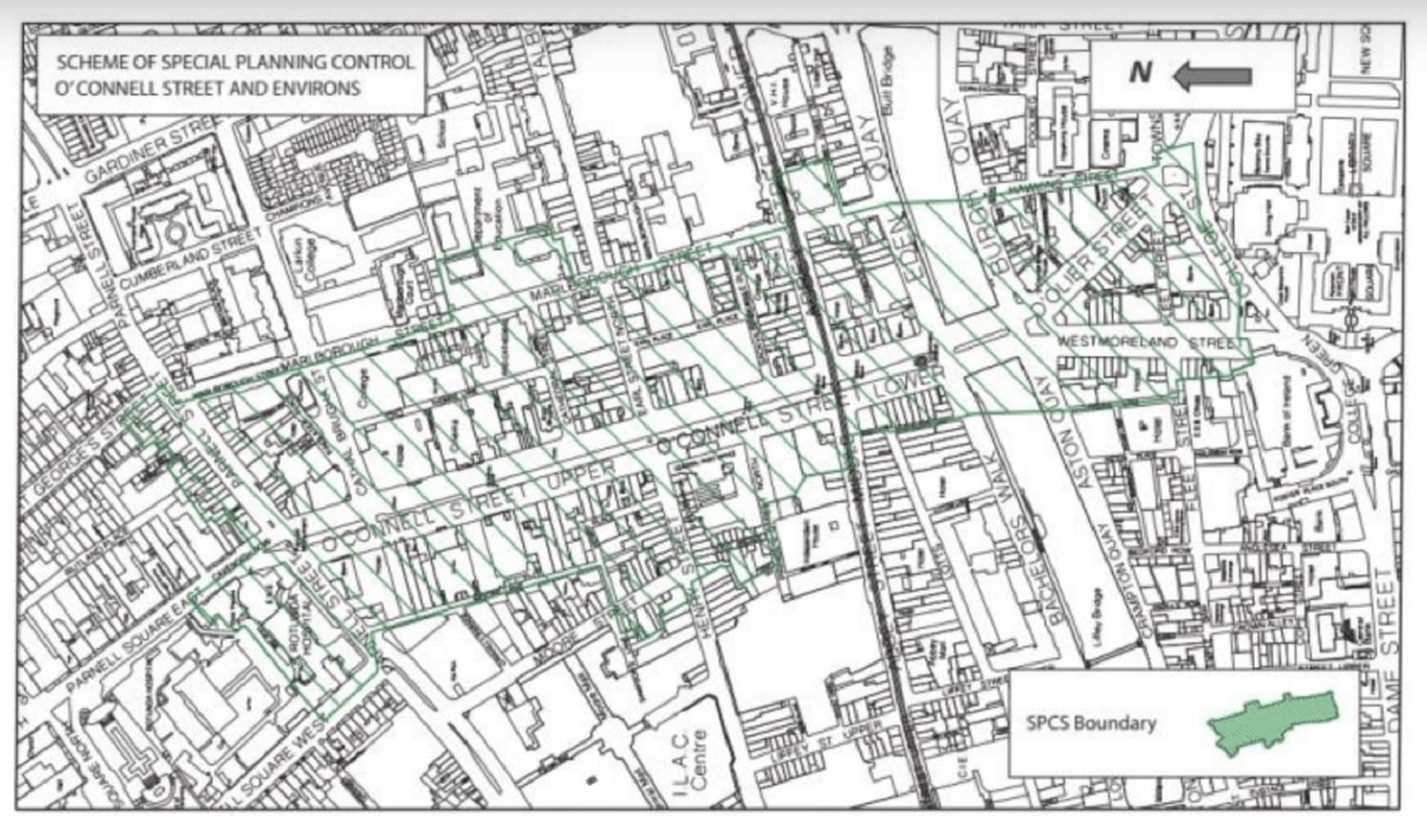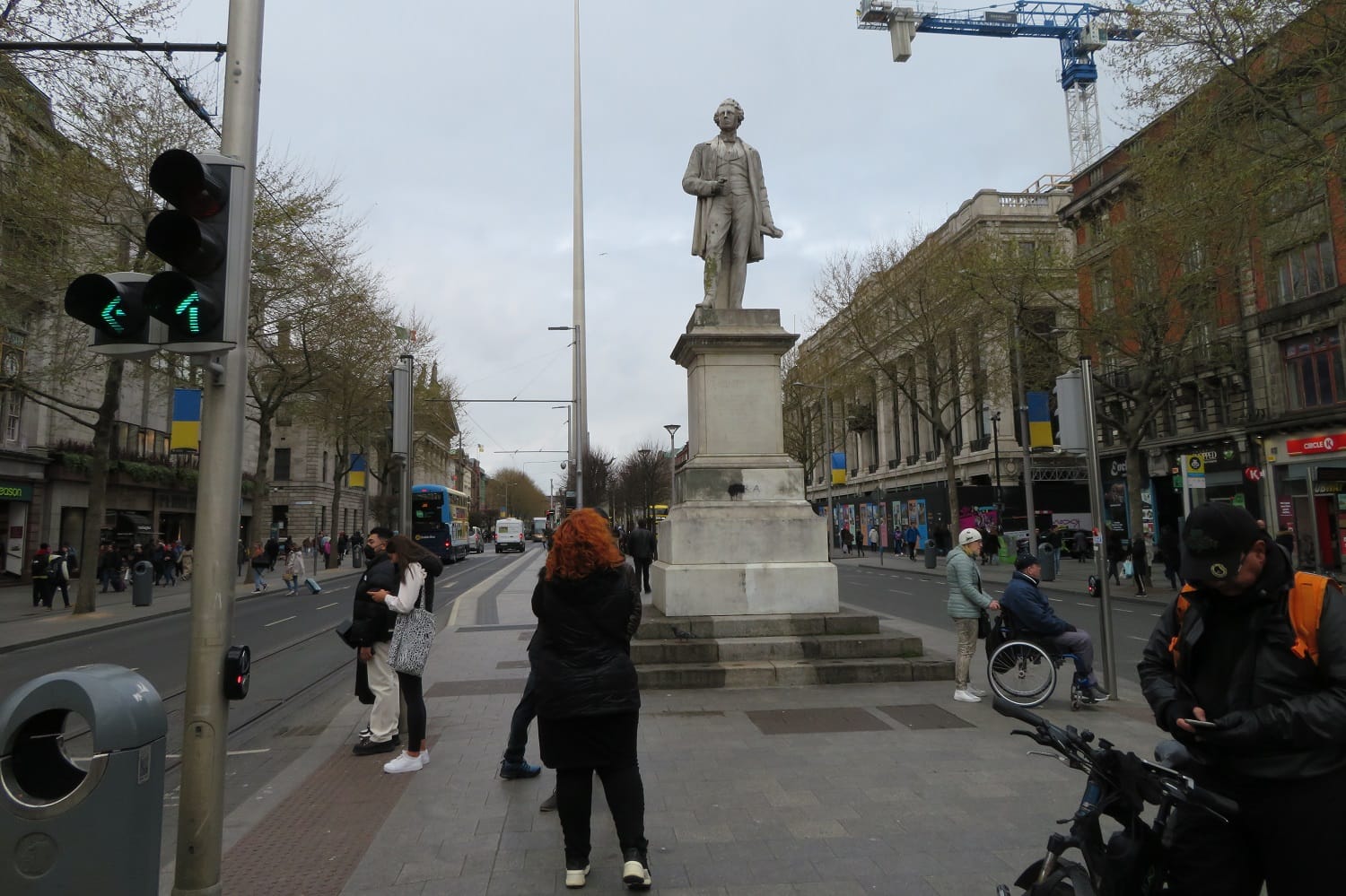What’s the best way to tell area residents about plans for a new asylum shelter nearby?
The government should tell communities directly about plans for new asylum shelters, some activists and politicians say.
But the special scheme to stop a spread of lower-end shops on and around the city’s main thoroughfare has been around almost two decades, say some councillors, and it doesn’t seem to be working.

For almost 20 years, Dublin City Council has banned new tourist information services, estate agents, supermarkets and mobile phone shops and a long list of other businesses from opening up on or around O’Connell Street.
A report presented to Dublin City councillors at their April monthly meeting on Monday recommends keeping the ban on most of those businesses, which applies just on O’Connell Street but also to stretches of surrounding streets.
An existing ban on adult stores and amusement arcades on the main streets in the area would be extended to smaller ones too. The ban on fast-food outlets would be relaxed on D’Olier Street, and North Earl Street and Middle Abbey Street, the report says, as long as they aren’t takeaways.
These and a few other proposed tweaks to the Scheme of Special Planning Control for O’Connell Street & Environs 2016 are due to go out to public consultation to see what Dubliners think.
While councillors at the monthly meeting on 4 April had thoughts on what should be allowed and what not, they also had bigger-picture concerns, they said.
The special planning scheme to stop a spread of lower-end shops on and around the city’s main thoroughfare has been around almost two decades, some councillors pointed out, and it doesn’t seem to be working.
A special planning scheme to control development on a strip of the city that covers O’Connell Street and a buffer of smaller streets to it east and west – and crosses the river to take in Westmoreland Street and D’Olier Street – was first introduced in 2003.
The aim was “to address concerns regarding the potential growth of lower end retail and other inappropriate uses”, says the current version of the special planning scheme, which was published in 2016.
The vision for O’Connell Street and the surrounding streets was a “place of importance in the social and cultural life of citizens and visitors, where buildings and their uses reflect a civic dignity and pride”, says the report.

Property owners should take their responsibilities as stakeholders on the main thoroughfare seriously, it says, and workers on O’Connell Street should enjoy fair working conditions “in this area of special significance to the Irish Nation”.
To achieve that, business owners looking to use space in the area for new ventures have, in certain cases, to apply for “change of use” planning permission, with some businesses not allowed, says the current version of the special planning scheme.
(If the new business is the same type as the old one it’s taking over from then it wouldn’t be a change of use.)
The council banned new bookmakers, amusement arcades, takeaways and discount stores throughout the area, as well as tourist information centres, laundrettes, off-licences and newsagents.
Charity shops, hairdressers, cosmetics stores, pharmacies, gift shops and ice-cream parlours are “open for consideration”, meaning planning can be granted for them, on a case by case basis.
According to a council survey, done as it works to draw up a new scheme, there has been a small increase in the number of vacant shops on O’Connell Street and there is “significant vacancy on O’Connell Street Lower”.
Some of the vacant premises used to be shops, banks, cafes and tourist offices and the increase in vacancy could be due to changing trends in banking and the pandemic, says the report.
In some buildings the upper floors are fully occupied but many upper floors are “clearly underutilised”, it says.
The redevelopment of the Carlton cinema and Clery’s department store have “collective potential to create new vitality through a balance of office, residential, and retail uses in the area”, it says.
There is a need to focus on rejuvenating the upper floors on the street as well, says the report, as many of them are vacant.
The report that the council’s chief planner John O’Hara presented to councillors on 4 April suggested that the council should relax the ban on fast-food restaurants, on D’Olier Street, North Earl Street and Middle Abbey Street.
The report cites “an increasing diversity of existing fast food outlets in regard to the range and quality of food available”.
Such businesses could be considered for permission as long as they are not takeaways, it says.
The draft report also proposes an all-out ban on amusement arcades and adult stores throughout the wider area.
Some councillors said they didn’t understand some of the targets.
Labour Councillor Joe Costello said: “I can’t for the life of me see why – if we are trying to encourage footfall in the area – we have a ban on newsagents, travel agents and tourist information.”
Sinn Féin Councillor Larry O’Toole said there were far too many fast-food restaurants on O’Connell Street and the problem all started with ice cream parlours.
“When I came to this city many years ago, this man said to me … that O’Connell Street was effed when they let the ice cream parlours in,” O’Toole said.
However, new ice cream parlours would not be subject to the all-out ban faced by multiple other types of businesses, but are assessed case by case.
Councillors weren’t convinced by the overall approach either, they said.
“I find this a very very puzzling report,” said Sinn Féin Councillor Mícheál Mac Donncha. “It’s not clear to me what has been achieved by this planning control to date.”
Costello, the Labour councillor, said that the special planning scheme has been in place for nearly 20 years, but O’Connell Street and the surrounding area “is the most neglected part of the city”.
Said Fine Gael Councillor Naoise Ó Muirí: “The scheme hasn’t really worked. I think we should take a hard look at it when it comes back [from public consultation].”
“The area of special planning control is only one mechanism that the city council is using with regard to O’Connell Street,” said O’Hara. “I hear what councillors are saying that it hasn’t worked to date.”
That planning scheme aims to control what shops are used for. There’s a second set of rules for O’Connell Street, triggered because it is a special area of architectural conservation, that cover design and the public realm.
Some people think that there are too many fast-food outlets on the street, while others think the council should relax the rules, said O’Hara.
The public consultation can facilitate a debate about those issues, he said. “The intention here is to go out on public display and go back to you.”
Fine Gael Councillor Ray McAdam lamented the state of O’Connell Street compared with other main streets of European capital cities.
“I strongly believe that O’Connell Street can be so much more than what it is today,” he said. “It is a sterile environment. The public realm is very harsh.”
The council needs to be more ambitious, in keeping up the built environment, the public spaces – and more greening would help too, he says.
Independent Councillor Cieran Perry asked whether the council could do more to encourage people to live above the shops on O’Connell Street.

People living on a street “addresses vacancy and more importantly adds vibrancy to our city centre”, he said. “It would be an absolutely fantastic location for anyone who wishes to live in the city centre.”
Social Democrats Councillor Cat O’Driscoll asked if there were any plans to incorporate murals or more public art on O’Connell Street. “They are an important part of the public realm and placemaking.”
O’Hara says that the council will look at incorporating art into the plans for the street.
After the public consultation, the draft scheme will feed into the new city development plan, he said.
The councillors at the meeting agreed that the draft plan should go out for consultation to see what Dubliners have to say.
Get our latest headlines in one of them, and recommendations for things to do in Dublin in the other.